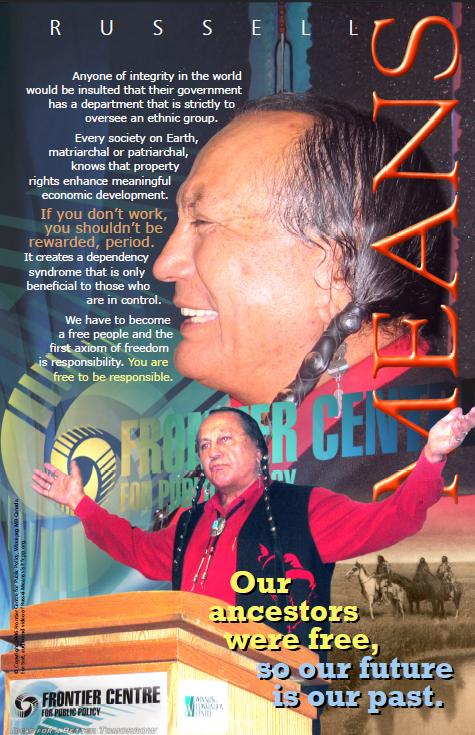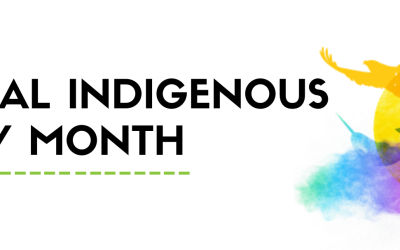Frontier Centre: You have said that the liberation of your people requires four changes: end the Bureau of Indian Affairs, create property rights on the reservation, have your own schools and have your own courts. The first — why end the Bureau of Indian Affairs?
Russell Means: The Bureau of Indian Affairs is a racist, colonial office that has total authoritarian control over Indian land, resources and people. Anyone of integrity in the world would be insulted that their government has a department that is strictly to oversee an ethnic group. That is Hitlerlism, that is apartheid, that’s everything this country and any country should be against. Let’s create a bureau of Jewish affairs and see how long that lasts, or a bureau of African affairs.
FC: Secondly, you want to create property rights on the reservation. Why?
RM: Because historically and traditionally, we have always been concerned with our Grandmother, the Earth, and the stewardship of the Earth. It would benefit our people. Every society on Earth, matriarchal or patriarchal, knows that property rights enhance meaningful economic development.
FC: Why do you also need to have your own schools?
RM: It is time that we forget these 4th century A.D. creations of the Holy Roman churches. That’s what the educational process is – Europeanized and worldwide in all disciplines. We need to take control of our own children. When I say “we,” I mean all the sacred colours of the human race.
FC: Lastly, why must you have your own courts?
RM: We have in the United States a tribal court system. But it is under the domination of a Communist reserve system that the United States of America instituted and ensures. This Communist system has to be destroyed. The number one issue is to create tribal courts separate from the rest of the government, so it can be independent and pass laws to protect investment and business.
FC: Why do you prefer the term Indian to aboriginal or native American?
RM: Because the word “Indian” is an English bastardization of two Spanish words, “in Dio”, in with God.
FC: The history of aboriginals in North American, Australia and New Zealand followed a similar pattern of war, then reserved lands with almost no recognition of individual rights, then entrenched poverty. Why? Could it have been different? Would equal citizenship have worked?
RM: First of all, every area was settled with deceit in mind and planning. When that deceit was uncovered, the Europeans had to resort to violence to overcome their deceit. That’s the simple answer.
FC: Is self-government or sovereignty a real option? Does it matter if you are ruled by bureaucrats at the Bureau of Indian Affairs or by home-grown despots?
RM: The future of the Indian in all the Americas is our past, because our culture is based on values, not song and dance.
FC: In both Canada and the United States, a lot of resources intended for your people’s benefit are siphoned off into what many call the “Indian Industry.” Is an elite of lawyers, consultants, bureaucrats and social workers enriching itself while the mass of people stay poor? Isn’t their poverty in this group’s interest?
RM: Everyone in this hemisphere has benefited from the poverty of the American Indian, every government, every church, every bureaucrat, every capitalist and every socialist. It is institutionalized Communism and our poverty enriches not the surrounding area, but the elite.
FC: One model that has been proposed in Canada to deal with high levels of Indian poverty is to take about half of the spending done on behalf of Indians and send it directly to individuals and families as an expansion of existing treaty payments. What do you think of this idea?
RM: I am totally against anything for free – that’s casinos, that’s government handouts. Anything you don’t work for you shouldn’t get. If you don’t work, you shouldn’t be rewarded, period. It creates a dependency syndrome that is only beneficial to those who are in control.
FC: In former years with the American Indian Movement, you were actively involved in direct political actions, like protests, boycotts, stand-offs – is that style now passé? Have you had any second thoughts?
RM: The American Indian Movement was a vanguard for Indian people. Indian people are now engaged in self-determination at their own speed so that is up to them. The need for the vanguard called the American Indian Movement has ceased to exist.
FC: One of your most famous speeches, delivered in 1980 in the Black Hills, was entitled, “For America to Live – Europe Must Die”. Do you still believe in that impossible metaphor? The Euro-American culture is dominant everywhere, it isn’t going to die.
RM: No it isn’t going to die, until the cataclysmic event happens. That is what the dominant society believes, that one day everything will end. It is not going to. The over 6,000-year history of patriarchy has proven that empires wither from within, but then another empire takes it place.
FC: You have proposed an intelligent plan for companies to outsource work to Indian reservations instead of other countries because of lower wages, no liability for health insurance and no unions. Indeed, that competitive dynamic is taking place on some of them. Aren’t short-sighted band leaders responsible for the fact that it is not universal?
RM: Yes, that’s true on the surface. But the colonial system implemented by the Europeans is what is manifest. So to stop the deprivation, we have to get rid of the colonialism, which is the government.
FC: In Canada, the flight of Indians from reserves into cities has abated at a point where about half have relocated. Many are now moving back to rural areas but not necessarily back to reservations. Is the same thing happening in the United States? What might explain that trend?
RM: The explanation of the trend is because Communism is alive and well on Indian reservations and Indian lands. We are not allowed to participate with the dominant society into their economic systems. Consequently, the Third World conditions of our reserves have caused us to become refugees in our own country. That is why we leave.
FC: If you compare Indians in Canada with those in the United States, which group is better off and why?
RM: This isn’t a contest. It’s colonialism and colonialism. It’s the same thing, and the results are the same.
FC: A recent shipment of your autobiography was blocked by Canada Customs before it arrived at the Frontier Centre. Why?
RM: Because of its title, Where White Men Fear to Tread. Maybe it’s because of the word “men.”
FC: Is this political correctness out of control?
RM: That speaks for itself.
FC: Could you give us your idea of a Utopia for your people? What will North American Indian culture look like in a hundred years if you had your way?
RM: Our ancestors were free, so our future is our past. We have to become a free people and the first axiom of freedom is responsibility. You are free to be responsible.
View in PDF format here.



